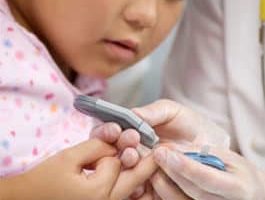american diabetes association
Missing sugar molecule raises diabetes risk in humans
Researchers at the University of California, San Diego School of Medicine and Rady Children’s Hospital-San Diego say an evolutionary gene mutation that occurred in human millions of years ago and our subsequent inability to produce a specific kind o…
La Jolla Institute-led team illuminates cell pathway key to insulin resistance in Type 2 diabetes
SAN DIEGO — (February 24, 2011) — A research team, led by La Jolla Institute scientist Joel Linden, Ph.D., has shed new light on the problem of insulin resistance, and identified the key participants in a molecular pathway that holds therapeu…
Convenient blood test not as effective for diagnosing diabetes in children
ANN ARBOR, Mich. — Doctors are increasingly using a convenient blood glucose test for diagnosing diabetes and pre-diabetes, but a study by the University of Michigan’s C.S. Mott Children’s Hospital shows it’s not the best way to diagnose diabetes …
New study suggests almonds may help reduce risk of type 2 diabetes and heart disease
Modesto, CA (Dec. 16, 2010) — With nearly 16 million Americans living today with prediabetes, a condition that is the precursor to type 2 diabetes, and half of all Americans expected to have either prediabetes or type 2 diabetes by the year 2020,…
La Jolla Institute validates Type 1 diabetes computer model’s predictive success through lab testing
SAN DIEGO — (December 9, 2010) — A La Jolla Institute team, led by leading type 1 diabetes researcher Matthias von Herrath, M.D., has demonstrated the effectiveness of a recently developed computer model in predicting key information about nas…
Antibiotic may reduce stroke risk and injury in diabetics
AUGUSTA, Ga. – A daily dose of an old antibiotic may help diabetics avoid a stroke or at least minimize its damage, Medical College of Georgia researchers report.
Minocycline, a drug already under study at MCG for stroke treatment, may help d…
Study shows sharp rise in cost of treating diabetes nationwide
The annual cost of diabetes in medical expenditures and lost productivity climbed from $98 billion in 1997 to $132 billion in 2002, according to a study by the American Diabetes Association (ADA) published in the March issue of Diabetes Care. The direct medical costs of diabetes more than doubled in that time, from $44 billion in 1997 to $91.8 billion in 2002. The study’s findings were announced jointly today by Health and Human Services Secretary Tommy G. Thompson and American Diabetes Association President Francine R. Kaufman, M.D. “Diabetes continues to be a huge financial burden on patients, their families and society, a burden that continues to grow in parallel with the obesity and diabetes epidemics in this country,” Secretary Thompson said.





